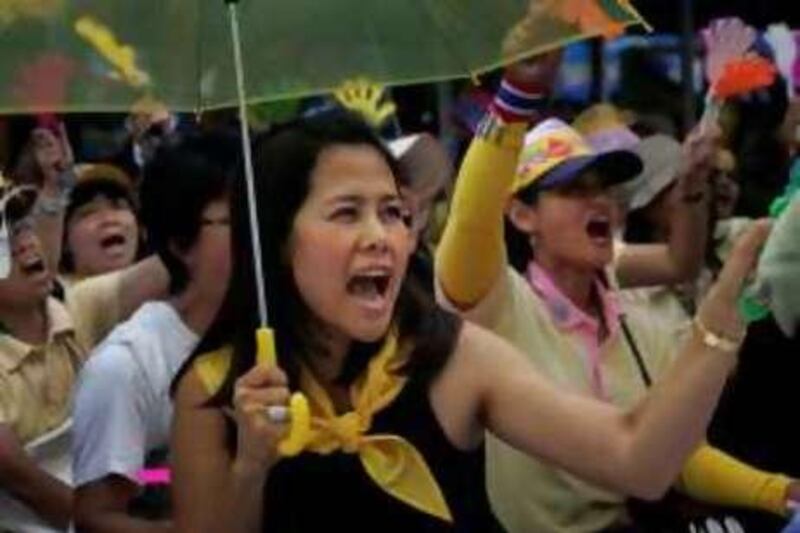Cracks were appearing in Thailand's government yesterday after the foreign minister said he would step down, piling the pressure on the prime minister, who has drawn criticism for declaring a state of emergency in the capital in a bid to quash protests against him. Tej Bunnag, a career diplomat, was resigning because of his wife's ill-health, an aide said, according to local TV. The surprise announcement comes as the seven-month-old government faces its worst political crisis since democratic elections last December. Thousands of anti-government protesters have occupied government buildings for over a week to try to push Samak Sundaravej from power. Police clashed with the protesters on Tuesday, leaving one dead and several injured, and resulting in Mr Samak declaring a state of emergency in the capital.
The decision puts the army in control of the streets for the first time since martial law was lifted after a military 2006 coup that ousted Thaksin Shinawatra, the former prime minister, from power. The protesters accuse Mr Samak of being a puppet for Mr Thaksin, who is in exile in the UK. "If it [the resignation] is true, it is another step towards the end of this falling government," Boonyakiat Karavekphan, an analyst at Ramkhamhaeng University, told Reuters. Even if the government falls, however, the conflict is far from over. There are several options out of the current impasse, including the resignation of the prime minister, the dissolution of parliament and the seemingly remote possibility of another coup, as different players jockey for position.
"There is a possibility that the prime minister will be forced to step down to form the new government," said Alongkorn Ponlabootr, the deputy leader of the opposition Democrat party. "It is highly involved behind the scenes." Mr Alongkorn said the decision to declare a state of emergency was a mistake. "It was the wrong decision, and I think something will happen in the next few days." Given recent history, the military is the obvious candidate to displace the civilian government, and the emergency rule enacted earlier this week placed the army chief, Gen Anupong Paochinda, in practical control of the capital.
An outright coup, however, seems unlikely not only because Gen Anupong has repeatedly denied any intention to oust the government (the 2006 coup leaders made similar protestations days before they took action), but also because he has consolidated a moderate cadre in the top echelons of military power. Mr Samak has also been careful to cultivate an understanding with the military leaders. When the anti-government protesters stormed Government House on Aug 26, the action that precipitated the current cascade of events, Mr Samak was conferring with the army chief at supreme military headquarters. In the annual reshuffle of top military posts, which was approved by the king later that week, Gen Anupong's allies consolidated control apparently without any political interference. "The hawks have pretty much faded out of the scene," said Avudh Panananda, a military affairs columnist for The Nation newspaper. "Certain officers might want to see the downfall of Samak, but they are not in a position stage a coup to accomplish this. "They would rather see the change via parliamentary system or street protests led by the People's Alliance for Democracy." With the army now on the streets, the military has assumed control for handling the protesters who are still camped out at Government House in Bangkok, and had occupied key airports in the south that cater to thousands of tourists every day. "Anupong is in charge of executing the emergency measures," Mr Avudh said. "He is running the show with Samak in the background. The Samak-Anupong alliance is working, hence there is no concern at this juncture for a coup. The utmost worry is whether and how Anupong will end the PAD rally inside Government House." But Gen Anupong has said the military would not tolerate bloodshed - a point where Mr Samak is particularly vulnerable because he is widely blamed for inciting the massacre of students at Thammasat University in 1976. And the army has been hesitant to use force against the protesters. And in the background is Thailand's much-revered king, Bhumibol Adulyadej, who is generally considered above politics, but has in the past defused political tension during times of crisis. Mr Tej, the foreign minister, had previously worked in the king's principal private secretary's office. Another pressing issue for Mr Samak is the election committee's suggestion that Mr Samak's People's Power Party should be banned for vote buying in December elections. If the Supreme Court rules against the PPP, dissolving the party and banning its members from politics for five years, it would certainly spell the end of Mr Samak's tenure in power. But even were Mr Samak to dissolve parliament and call snap elections, the Democrats, the country's main opposition, acknowledge that supporters of the current government would still likely carry the day. "It's obvious that we will lose an advantage in the coming election. There is the possibility that we will be defeated," Mr Alongkorn said. "We don't want history to be repeated, but in reality and in practicality, the Thaksin party will win the next election, even though the People's Power Party is dissolved." jschertz@thenational.ae





